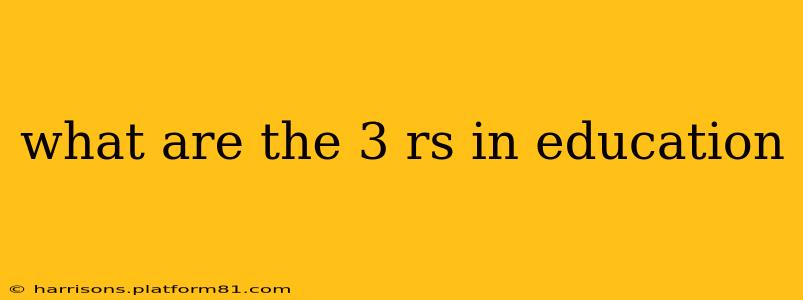What Are the 3 Rs in Education? A Deep Dive into Reading, 'Riting, and 'Rithmetic
The "3 Rs" – Reading, 'Riting (Writing), and 'Rithmetic (Arithmetic) – represent the foundational skills traditionally considered essential for a basic education. While the phrase itself is somewhat dated, the core principles remain incredibly relevant in modern education. This article delves deeper than a simple definition, exploring the significance of each "R" and how they've evolved in contemporary classrooms.
What is the importance of Reading in education?
Reading is the cornerstone of learning. It's the gateway to accessing information, understanding different perspectives, and developing critical thinking skills. Proficiency in reading unlocks a world of knowledge, enabling students to learn about history, science, literature, and countless other subjects. Beyond academic success, strong reading skills are vital for everyday life, from understanding instructions to engaging with news and literature. The ability to decode text, comprehend meaning, and analyze information is crucial for success in virtually any field.
What is the importance of Writing in education?
Writing isn't just about correct spelling and grammar; it's about communication, self-expression, and critical thinking. Students use writing to articulate their thoughts, organize their ideas, and present arguments. The ability to write clearly and effectively is essential for academic success, career advancement, and personal growth. Different forms of writing, from essays and reports to creative writing and emails, develop diverse skills and foster creativity. The process of writing itself sharpens critical thinking as students learn to structure arguments, analyze information, and communicate effectively.
What is the importance of Arithmetic in education?
Arithmetic, the foundation of mathematics, forms the basis for understanding numerical concepts and problem-solving. It encompasses basic operations like addition, subtraction, multiplication, and division, providing a springboard to more advanced mathematical concepts. Proficiency in arithmetic is not only essential for academic pursuits in STEM fields but is also critical for everyday tasks such as managing finances, interpreting data, and understanding proportions. Arithmetic develops critical thinking skills, fostering logical reasoning and problem-solving abilities.
Beyond the 3 Rs: What other skills are important today?
While the 3 Rs remain fundamental, modern education emphasizes a broader range of skills. These include:
- Critical Thinking: Analyzing information, forming reasoned judgments, and solving problems effectively.
- Creativity and Innovation: Generating novel ideas, exploring possibilities, and developing creative solutions.
- Communication: Expressing ideas clearly and effectively, both verbally and in writing.
- Collaboration: Working effectively with others to achieve shared goals.
- Digital Literacy: Understanding and using technology effectively.
These skills, often grouped under the umbrella term "21st-century skills," complement the traditional 3 Rs and are increasingly important in today's world.
How have the 3 Rs evolved in modern education?
The 3 Rs haven't remained static. Modern approaches emphasize deeper understanding and application rather than rote memorization. For example, reading instruction often incorporates strategies like phonics and comprehension techniques. Writing instruction focuses on clear communication and various writing styles. And arithmetic instruction emphasizes conceptual understanding and problem-solving alongside computational skills. Technology also plays a significant role, with interactive learning tools and digital resources enhancing the learning experience.
In conclusion, while the "3 Rs" might seem like an old-fashioned phrase, the skills they represent—reading, writing, and arithmetic—remain fundamental to a well-rounded education. However, contemporary education recognizes the importance of a broader skill set, encompassing critical thinking, creativity, and digital literacy, to prepare students for success in the 21st century and beyond.
